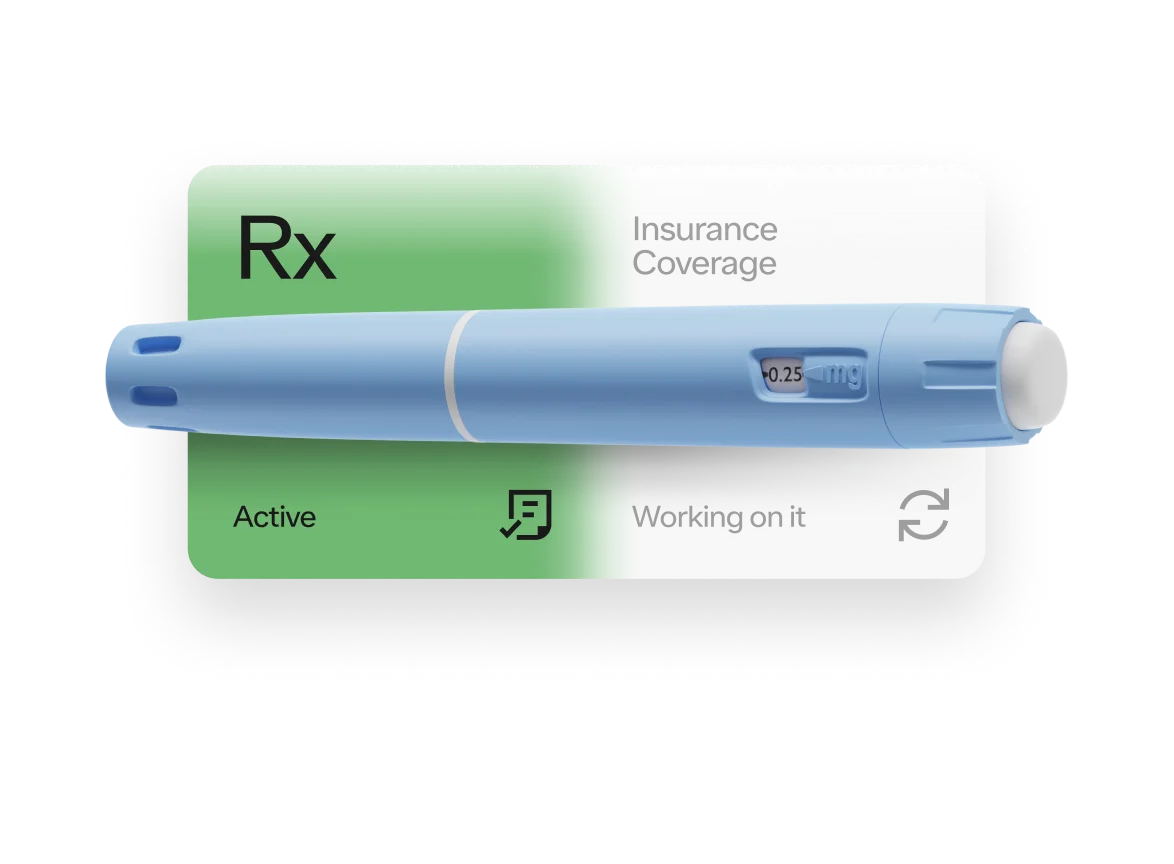Key takeaways
In a recent clinical trial involving adults with both chronic kidney disease (CKD) and type 2 diabetes, Ozempic (semaglutide) reduced the risk of major kidney-related events by 24%.
Other research links semaglutide with kidney-related health benefits in various populations, including those without diabetes but with obesity or heart disease.
More inclusive research is needed to determine if Ozempic's potential kidney benefits are consistent across different racial groups and genders.
Here's what we'll cover
Here's what we'll cover
Here's what we'll cover
Key takeaways
In a recent clinical trial involving adults with both chronic kidney disease (CKD) and type 2 diabetes, Ozempic (semaglutide) reduced the risk of major kidney-related events by 24%.
Other research links semaglutide with kidney-related health benefits in various populations, including those without diabetes but with obesity or heart disease.
More inclusive research is needed to determine if Ozempic's potential kidney benefits are consistent across different racial groups and genders.
When it first hit the market in 2017, Ozempic (semaglutide) was only FDA-approved to treat type 2 diabetes. Since then, it’s also gotten the green light to reduce the risk of major cardiovascular problems in certain people and garnered much attention for other potential (off-label) benefits. Now, emerging research suggests Ozempic might also be able to reduce the risk of kidney complications, heart issues, and death in patients with type 2 diabetes and chronic kidney disease (CKD).
Read on to learn more about Ozempic’s potential effects on kidney function and disease and more.
Ozempic Important Safety Information: Read more about serious warnings and safety info.
What is Ozempic?
Ozempic (semaglutide) is a weekly injection that’s approved by the US Food and Drug Administration (FDA) for managing type 2 diabetes in adults. The medication is also approved to reduce the risk of major cardiovascular problems (e.g. heart attack, stroke) in adults with type 2 diabetes mellitus, established heart disease, and obesity (body mass index, or BMI, of 30+) or overweight (BMI of 27+).
Ozempic is classified as a glucagon-like peptide-1 (GLP-1) agonist, a type of medication that mimics the GLP-1 hormone naturally found in your body. More specifically, Ozempic binds to GLP-1 receptors, telling the pancreas to release more insulin into the bloodstream after you eat. This can help lower and stabilize blood sugar levels. In addition to promoting insulin secretion, Ozempic can also decrease the amount of sugar released by your liver. It also can slow digestion and influence your brain’s regulation of appetite, often resulting in significant weight loss.
Can Ozempic help chronic kidney disease (CKD)?
If diabetes is not well-managed with medication and lifestyle changes, blood sugar levels can rise. Over time, high blood sugar levels can damage blood vessels, including those in the kidneys, and potentially lead to chronic kidney disease (CKD). Having high blood sugar levels can also directly damage proteins that are responsible for filtration in the kidneys. CKD frequently occurs in individuals with type 2 diabetes, affecting up to 40% of this population.
People with diabetes who develop kidney disease are likely to experience disease progression, meaning that their kidney function usually worsens with time until the kidneys ultimately fail. Since Ozempic can be effective for controlling blood sugar levels, it seems logical that semaglutide (the active ingredient in Ozempic as well as Wegovy) could help prevent or delay complications from diabetes, including advanced kidney disease. To confirm this, though, scientists needed to do clinical trials to see whether Ozempic could help lower the risk of negative outcomes for people living with both conditions. And that is just what they did.
In the recent FLOW clinical trial involving adults with both CKD and type 2 diabetes, Ozempic reduced the risk of major kidney-related events by 24%. This means those taking Ozempic were less likely to experience the following problems:
Kidney function decline of 50% or more
Kidney failure
Need for dialysis
Need for a kidney transplant
Death from kidney disease
Death from cardiovascular disease, such as heart attacks and strokes
It also found that adults using Ozempic had a lower risk of dying from any cause compared to those using a placebo.
The trial, which began in June 2019 with plans to continue until August 2024, ended up being cut short because the research showed such strong benefits in the Ozempic group. Ending a clinical trial early due to positive results often means that healthcare professionals can start using the information to help more of their patients sooner. (Plus, it’s also not exactly ethical to continue to give half of the participants a placebo when the treatment being studied has been shown to reduce the risk of death.)
While this trial and other studies (which we discuss below) suggest promising results regarding Ozempic and kidney function, the existing evidence does have some limitations. For starters, high-risk groups that could potentially benefit from the treatment have been underrepresented in the research. For instance, the majority of participants in these trials were white, with limited representation from Black and other racial groups, which are disproportionately affected by type 2 diabetes and its complications, including CKD. Also, these studies mainly included male participants. More research is needed to determine if semaglutide's kidney benefits are consistent across different races and genders.
Wegovy Important Safety Information: Read more about serious warnings and safety info.
Can Ozempic benefit kidney health overall?
Semaglutide has shown promising benefits for kidney health in various clinical trials.
One clinical trial looked at the effects of Ozempic in people with both type 2 diabetes and heart disease and found that participants taking Ozempic (vs. a placebo) had lower rates of new or worsening kidney disease. While kidney health was not the main focus of this study, the findings suggest that semaglutide may help protect kidney function in people with certain conditions.
In another study, researchers analyzed the data from previous clinical trials of Wegovy. They found that semaglutide improved albuminuria—i.e. an early sign of kidney disease—in people with type 2 diabetes and obesity or overweight. Similar kidney health benefits were also observed in a large clinical trial that involved people with cardiovascular disease and overweight or obesity. It’s important to note that the previous Wegovy studies that were analyzed and the larger clinical trial were not designed to measure kidney health but were able to identify them anyway.
Overall, the available evidence does seem to suggest that semaglutide can benefit kidney health across different patient populations. Speaking of which…
Who could benefit from Ozempic for kidney health?
Based on the characteristics of people included in the aforementioned studies, semaglutide may provide kidney health benefits to the following groups:
Adults with type 2 diabetes at higher risk for serious cardiovascular problems, such as heart attack
Adults with overweight/obesity and type 2 diabetes with CKD
People ages 45 or older with both cardiovascular disease and overweight or obesity who do not have diabetes
It's possible that other people could potentially experience kidney-related perks from semaglutide but, again, more research is needed.
Bottom line on Ozempic and kidney health
Semaglutide (the active ingredient in Ozempic and Wegovy) is widely recognized as a safe and effective treatment option for managing type 2 diabetes, obesity and overweight, and reducing the risk of cardiovascular disease in select populations. We may also be able to add more conditions, such as kidney disease, to this list in the not-too-distant future.
The recent FLOW clinical trial found that Ozempic can reduce the risk of major kidney-related events—e.g. kidney failure, need for dialysis or kidney transplant, death from kidney disease, and more—by 24% in adults with both CKD and type 2 diabetes. And while growing evidence seems to support the potential benefits of semaglutide for kidney health in certain people, additional research is needed to confirm these potential benefits across more diverse populations.
Intrigued by these findings? Or been interested in trying a semaglutide-based medication, such as Ozempic or Wegovy, for some time? Speak to a healthcare provider, such one as through Ro, to find out if these drugs may be beneficial for your health needs and goals.
DISCLAIMER
If you have any medical questions or concerns, please talk to your healthcare provider. The articles on Health Guide are underpinned by peer-reviewed research and information drawn from medical societies and governmental agencies. However, they are not a substitute for professional medical advice, diagnosis, or treatment.
References
Bonner, R., Albajrami, O., Hudspeth, J., & Upadhyay, A. (2020). Diabetic Kidney Disease. Primary Care, 47(4), 645–659. doi: 10.1016/j.pop.2020.08.004. Retrieved from https://pubmed.ncbi.nlm.nih.gov/33121634/
Deichmann, R. E., Krousel-Wood, M., & Breault, J. (2016). Bioethics in Practice: Considerations for Stopping a Clinical Trial Early. Ochsner Journal, 16(3), 197–198. Retrieved from https://www.ncbi.nlm.nih.gov/pmc/articles/PMC5024796/
Fischl, A. H. (2019). Diabetes and chronic kidney disease basics: part one. Journal of Renal Nutrition, 29(5), 13-17. doi: 10.1053/j.jrn.2019.01.014. Retrieved from https://www.kidney.org/sites/default/files/diabetes_and_chronic_kidney_disease_basics_part_one_.pdf
Frías, J. P., Auerbach, P., Bajaj, H. S., et al. (2021). Efficacy and safety of once-weekly semaglutide 2·0 mg versus 1·0 mg in patients with type 2 diabetes (SUSTAIN FORTE): a double-blind, randomised, phase 3B trial. The lancet. Diabetes & Endocrinology, 9(9), 563–574. doi: 10.1016/S2213-8587(21)00174-1. Retrieved from https://pubmed.ncbi.nlm.nih.gov/34293304/
Haw, J. S., Shah, M., Turbow, S., et al. (2021). Diabetes complications in racial and ethnic minority populations in the USA. Current Diabetes Reports, 21(1), 2. doi: 10.1007/s11892-020-01369-x Retrieved from https://www.ncbi.nlm.nih.gov/pmc/articles/PMC7935471/
Heerspink, H. J. L., Apperloo, E., Davies, M., et al. (2023). Effects of semaglutide on albuminuria and kidney function in people with overweight or obesity with or without type 2 diabetes: exploratory analysis from the STEP 1, 2, and 3 trials. Diabetes Care, 46(4), 801-810. doi: 10.2337/dc22-1889. Retrieved from https://www.ncbi.nlm.nih.gov/pmc/articles/PMC10090901/
Leehey, D. J., Rahman, M. A., Borys, E., et al. (2021). Acute kidney injury associated with semaglutide. Kidney Medicine, 3(2), 282-285. doi: 10.1016/j.xkme.2020.10.008. Retrieved from https://pubmed.ncbi.nlm.nih.gov/33851124/
Lincoff, A. M., Brown-Frandsen, K., Colhoun, H. M., et al. (2023). Semaglutide and cardiovascular outcomes in obesity without diabetes. The New England Journal of Medicine, 389(24), 2221-2232. doi: 10.1056/NEJMoa2403347. Retrieved from https://pubmed.ncbi.nlm.nih.gov/37952131/
Marso, S. P., Bain, S. C., Consoli, A., et al. (2016). Semaglutide and cardiovascular outcomes in patients with type 2 diabetes. The New England Journal of Medicine, 375(19), 1834-1844. doi: 10.1056/NEJMoa1607141. Retrieved from https://pubmed.ncbi.nlm.nih.gov/27633186/
National Kidney Foundation. (2020). Race, Ethnicity, & Kidney Disease. Retrieved from https://www.kidney.org/atoz/content/minorities-KD#:~:text=In%20fact%2C%2013%25%20of%20Black,kidney%20disease%20and%20kidney%20failure
Perkovic, V., Tuttle, K. R., Rossing, P., et al. (2024). Effects of semaglutide on chronic kidney disease in patients with type 2 diabetes. The New England Journal of Medicine, 391(2), 109-121. doi: 10.1056/NEJMoa2403347. Retrieved from https://pubmed.ncbi.nlm.nih.gov/38785209/
U.S. Food and Drug Administration (FDA). (2023). Full Prescribing Information: Ozempic (semaglutide) injection, for subcutaneous use. Retrieved on Jul. 3, 2024 from https://www.accessdata.fda.gov/drugsatfda_docs/label/2023/209637s020s021lb













